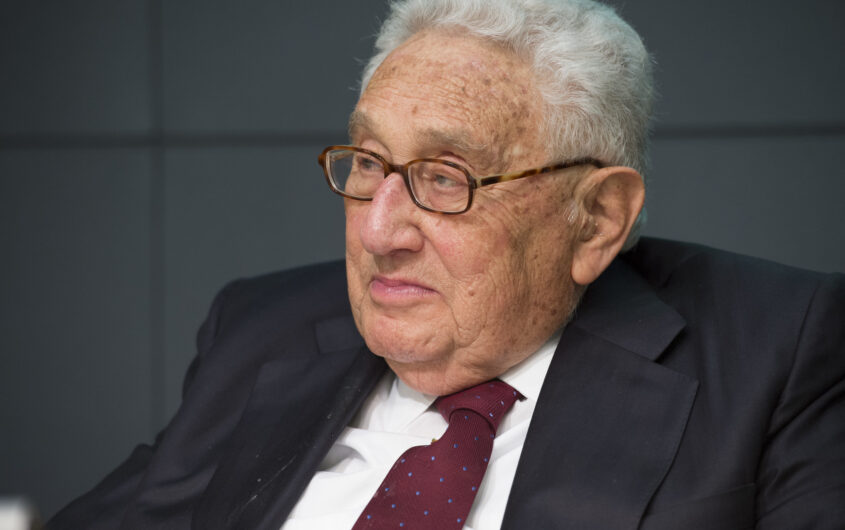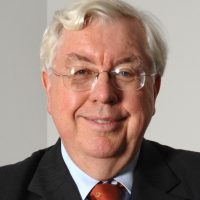
Henry Kissinger at the 2012 AICGS Symposium
Henry Kissinger at 100

John Kornblum
AGI Trustee
John Kornblum is a senior counselor at the international law firm Noerr LLP and a former U.S. ambassador to Germany. He is a member of the AGI Board of Trustees.
Henry Kissinger is undoubtedly the most well-known living statesman in the world of diplomacy and global strategy. His tireless engagement for a stable world order is legendary. Kissinger’s fellow American ex-diplomat John Kornblum honors this unique political figure on his 100th birthday. This Op-Ed was originally published in German in Die Welt on May 26, 2023.
Political leaders may come and go, but there is only one who has maintained constant global influence for nearly seventy-five years. Henry Kissinger is still going strong after decades in public life in the United States, Europe, and Asia. Celebrating his 100th birthday on May 27, “Henry,” as he is affectionately known to everyone, continues to build on even his own prodigious record.
Still Active at 100
Despite his age, the world’s most famous career statesman remains both active and respected in the worlds of diplomacy and geopolitics. He has recently published two well-received books, including a future-oriented volume on artificial intelligence and a very personal memoir on the important world leaders he has known, beginning with Konrad Adenauer. He has also appeared across the globe on satellite interviews and topped it off with two recent eight-hour sessions marking his birthday with the British magazine The Economist.
Leadership is Essential
The importance of political leadership to the maintenance of a stable world order remains one of Kissinger’s most important subjects. He is tireless in his efforts to add reason and coherence to the often-irrational world of diplomacy.
Needless to say, he never criticizes presidents and prime ministers by name, but he leaves no doubt that he finds leadership to be painfully absent from today’s world, including in the United States.
While Kissinger often finds easy consensus with leaders of other nations on the need for a rational, long-term basis for a global order, he remains frustrated with the American tendency to seek short-term advantage. Asked recently by a TV interviewer whether Chinese President Xi or Russian President Putin would answer the telephone if he called, Kissinger paused for a minute, and said “They probably would.”
Kissinger’s success in helping Germany to return to the Western world contributed importantly to the success of the Federal Republic and ultimately the end of the Cold War.
Henry Kissinger was the American Secretary of State, and his convictions have presented a paradox, which showed up in several recent TV interviews in the run-up to his birthday.
Despite his many achievements, Kissinger has often found himself the center of controversy in his own country. His steady, reasonable approach to diplomacy often cut across the more idealistic and emotional reactions in American society.
As a testy exchange on an American television network recently demonstrated, criticism of his role in the Vietnam War and events in Chile, Cyprus, and elsewhere continue to follow him along the interview circuit in the United States. And the pain which showed on his face as the questions were being asked, showed how much these “unfair judgments” still hurt.
Kissinger the Idealist
This very human show of emotion did not fit with Henry Kissinger’s public persona as a tough-minded Machiavellian. But after more than fifty years of observing and working under Henry Kissinger, I have come to agree strongly with the assessment of Kissinger’s official biographer Niall Ferguson, who concluded that Henry Kissinger is more idealist than Realpolitiker. And he feels hurt when he is misunderstood.
As Professor Ferguson puts it, Kissinger’s idealism was tempered by the dramatic circumstances he endured. But it was genuine and effective. In his book Kissinger the Idealist, Professor Ferguson concludes:
“Kissinger was a Kantian Idealist, not a Wilsonian Idealist. To the Wilsonian argument that the United States should ‘confine our actions to situations in which our moral, legal, and military positions are completely in harmony,’ Kissinger had a consistent reply: ‘To deal with problems of such ambiguity, [requires] a …willingness to run risks…for a less than perfect application of one’s principles.”
Even today, as he has celebrated his hundredth birthday, the pragmatism of Kissinger’s Kantian rhetoric often seems to be politically defeatist to American eyes and ears tuned to the search for perfection in American life.
But it was his understanding of the ambiguity in relations between nations that made possible his historic contributions to American and world diplomacy. His success in building steady, peaceful relationships among big powers in the 1970s remains unmatched in diplomatic history.
Complex Relationship with Germany
Germans have over the years also been somewhat uncertain about where to place Henry Kissinger. Pride in his achievements is tempered by the tragic circumstances under which his family was forced to leave Germany and what seemed to be his often-ruthless application of American power to conflicts most Europeans would rather avoid.
Kissinger’s own approach to Germany is equally complex. Beginning shortly after World War II, he began to build contacts with postwar Germany as one of Europe’s most important countries. His contributions to “reopening” Germany after World War II are not often understood. But his success in helping Germany to return to the Western world contributed importantly to the success of the Federal Republic and ultimately the end of the Cold War.
Kissinger the Ostpolitiker
After 1970, German efforts to reestablish ties to the East became a central element of Kissinger’s own global strategy with Russia and China.
And Kissinger’s willingness to influence the Soviet leadership in support of Willy Brandt’s Ostpolitik was undoubtedly one of the most important reasons for the success of East-West détente in the 1970s.
The first successful German-American initiative was in Berlin. The Quadripartite Berlin negotiations were accompanied by direct American intervention with Moscow. In his memoirs on the White House years, Kissinger concluded: “Berlin became the key to the whole puzzle.”
Kissinger’s lingering doubts about Germany’s role were reflected fifty years later in the Economist interview in May 2023. When asked how Europe’s future would be determined, Henry doubted that Germany would play a leading role.
Discussing the implications for Europe of the Russian invasion of Ukraine, Kissinger noted, “The young generation in Germany has been brought up on the history of the failures of their parents and grandparents. Germany will …. always play a significant role, but I think the intellectual leadership in this next phase needs to come from both Britain and France.”
In other words, Germans must first heal the traumas inherited from the twentieth century before they can take over a leading role in the twenty-first. A Zeitenwende will not arrive soon.









